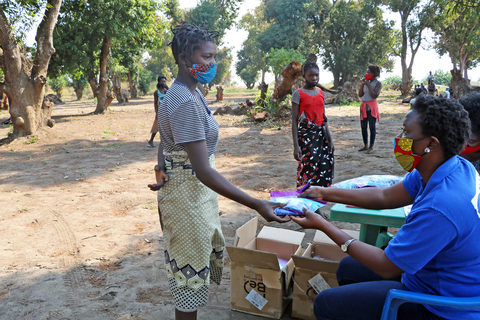Adapted from stories provided by Plan International
Buzi district was one of the areas most affected by Cyclone Idai in Sofala Province, Mozambique, in 2019. Over a year later, many who lost their homes due to intense flooding face water shortage issues, impacting a girl and woman’s ability to adequately look after their monthly menstrual cycle and personal hygiene.
Exacerbated by the COVID-19 pandemic, many families are in worse financial situations than before - making disposable sanitary pads a luxury to adolescent girls and young women who live in the Idai accommodation centers.
Domingas is a 15-year-old girl from Sofala province that has been living in the Nhamatanda
accommodation center for over a year with her parents and 6 siblings. With her parents unemployed and fully dependent on their small plot of land for food, she has not had access to menstrual products, including underwear and menstruation pads, for months.
“I have difficulties purchasing sanitary pads because they are expensive; I cannot buy them every month. When I do not have disposable sanitary pads, I make a multi-layered pad with pieces of cloth. But those are uncomfortable, and because they leak I cannot be very active through the day, which means I cannot help my parents in the field,” says Domingas.
Led by the Government of Mozambique, and through funding support from the Government of Norway, and in partnership with BeGirl Mozambique, the Association for the Promotion and Development of Women (MAHLAHLE) and Plan International Mozambique, hundreds of Cyclone-affected young women and adolescent girls living in accommodation centers in Sofala Province are receiving reusable menstrual underwears.
“Menstruation should be a normal, healthy part of a female’s life but for many girls and young women across the globe, menstruation can be a monthly struggle. Before the pandemic, more than 500 million women and girls worldwide lacked the necessary means to manage their menstrual cycle aka “period poverty”, which creates barriers to health, education and success opportunities,” shared Andrea M. Wojnar in a statement during “Menstrual Hygiene Day” in May 2020.
The project has provided more than 4,000 girls with menstrual hygiene products (menstrual underwear, menstrual pads, education tools) equipping them with material that would normally be expensive and difficult to access, particularly during the COVID-19 pandemic. Not having menstrual hygiene products and limited access to clean water may impede them from daily activities such as going to school, helping with domestic chores and socializing.

Without proper menstrual hygiene in place, particularly in warm, humid climates, girls and women are at greater risk of infections with impacts on their physical and mental health and well-being.
“Prior to COVID-19, I would be absent for a few days when I was menstruating because I did not have adequate materials for menstrual hygiene. Since I have received the reusable underwear...I can continue to be productive during my menstruation. I can go to school and not be behind on my studies,” says Domingas.
Amidst a Cyclone or COVID-19, something as natural as a monthly period that is experienced by half of the world’s population, including girls like Domingas, should not add to the burden of stress, nor bring with it shame, health complications or stigma.
UNFPA’s support to the Government of Mozambique, with the involvement of various implementing partners, is aiming to ensure that adolescent girls and young women are informed and supported with supplies and materials to take charge of their bodies and menstrual hygiene.
*In 2020, UNFPA supported a qualitative study - Menstrual Management Amid Dual Disasters: Cyclone Idai Plus COVID-19 in Sofala, Mozambique - in collaboration with the Ministry of Education and Human Development, BeGirl and Plan International. Read the report to hear what girls – and boys – have to say about barriers and solutions for managing menstruation amid overlapping disaster contexts.


